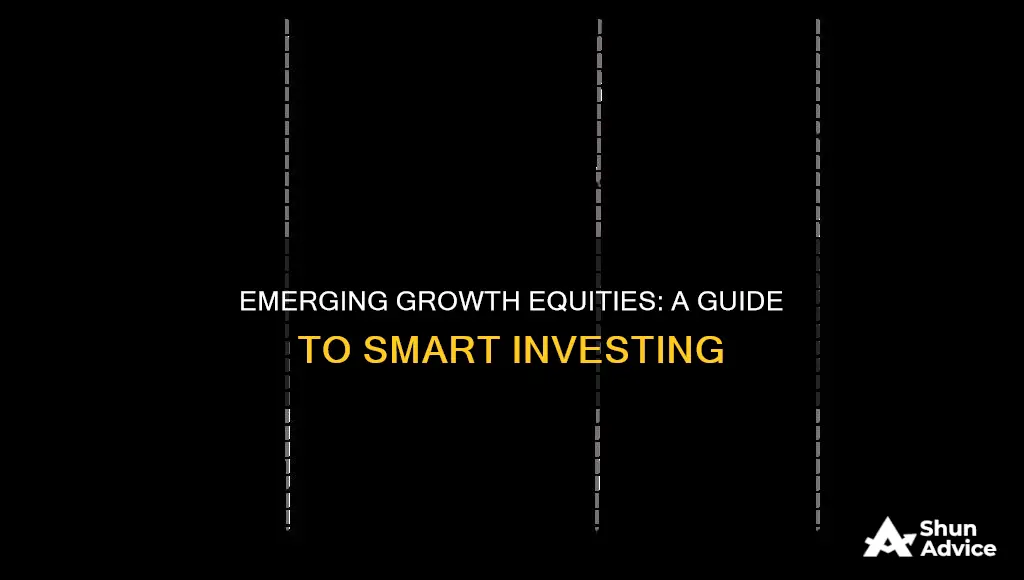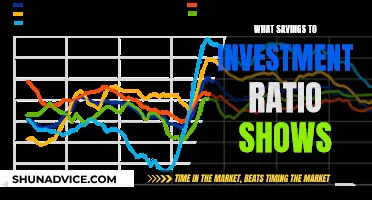
Investing in emerging markets can be a great way to diversify your portfolio and capitalise on high-growth economies. However, it is important to note that these investments come with higher risks than those associated with developed markets. Emerging markets are typically defined as countries or regions that are undergoing rapid economic growth and have not yet reached their full economic potential. While there are huge gains to be made, the risks involved are often understated. This article will outline the key considerations for investing in emerging growth equities, including the potential benefits and drawbacks, as well as practical steps for getting started.
| Characteristics | Values |
|---|---|
| Definition | Economies that exist between the stages of developing and developed |
| Phase | High-growth with rapid expansion and improvement |
| Typical Countries | India, China, Russia, Brazil, Mexico, Pakistan, Saudi Arabia, Colombia, Chile, Czech Republic, Egypt, Greece |
| Typical Funds | Mutual funds, exchange-traded funds (ETFs) |
| Typical Securities | Stocks, bonds, and other securities |
| Risk | Higher than developed markets due to political, economic, and currency factors |
| Returns | High-growth and high-returning stocks |
| Benefits | Growth, diversification, exposure to differentiated businesses and geographies |

Political risk
Firstly, it is important to understand that emerging market businesses often face higher levels of government intervention compared to developed nations, which tend to follow a free-market discipline of low government intervention. This intervention can take the form of privatisation demands, tax increases, loss of subsidies, changes in market policy, or laws affecting resource extraction.
Secondly, political risk can manifest in the form of elections, economic crises, and changing societal attitudes, which can disrupt even the best-laid plans of multinational corporations. A change in government can bring about shifts in policies and regulations, impacting the business environment and profitability.
Additionally, the possibility of war, civil unrest, or a complete shutdown of industry due to political instability can significantly affect the stability of investments in emerging markets. Political events can also impact the ability to control inflation, which is a key factor in economic growth and currency valuation.
Furthermore, governments in emerging markets may divert profits from foreign investments through regulation or selective lack of regulation, impacting the profitability of investments. This can be a hidden risk, as traditional ways of limiting risk may not be effective in these situations, and companies need to learn to navigate the political landscape directly.
Finally, political risk can also be influenced by the level of economic growth and development within a country. Countries with consistent economic growth and little political or social unrest are generally considered lower-risk investments. Therefore, it is crucial for investors to monitor and assess the political landscape and stability of emerging markets before investing, as well as keep a long-term perspective due to the potential volatility of these markets.
Understanding Investment Manager Research: Strategies and Insights
You may want to see also

Economic risk
Investing in emerging markets can be a risky business, and economic risk is one of the three main types of risk that investors face when investing in these markets, the other two being political and currency risk.
For example, Russia in the 1990s experienced a massive debt default due to the aftermath of communism and poor monetary management, which devalued the country's currency, the ruble. This made Russia a less attractive investment prospect at the time.
To mitigate economic risk when investing in emerging markets, investors should consider diversifying their investments across different sectors and countries. Consulting a financial advisor with experience in international investments can also help tailor a strategy that takes into account the investor's risk tolerance and goals.
While economic risk is a significant consideration, it is important to remember that emerging markets offer high growth potential and diversification benefits that can make them attractive investment opportunities.
Building a Million-Dollar Investment Portfolio: Strategies for Success
You may want to see also

Currency risk
The value of emerging market currencies compared to the dollar can be extremely volatile. Any investment gains can be potentially lessened if a currency is devalued or drops significantly. For example, an American who purchases a Brazilian stock in Brazil will have to buy and sell the security using the Brazilian real. Therefore, if the real depreciates by 10%, the investor will experience a net loss in terms of total returns when selling and converting back to US dollars.
Another example of currency risk is Russia's currency, the ruble, which massively devalued following the aftermath of communism and poor monetary management, creating a massive debt default.
To mitigate the risks of investing in emerging markets, it is recommended to diversify your investment by using mutual funds or ETFs that focus on emerging markets, as they offer a blend of stocks from various sectors and countries.
Exploring Vietnam: Investment Opportunities for Indian Investors
You may want to see also

Growth potential
Emerging markets offer serious potential for growth. They are countries experiencing rapid economic growth and industrialization, but that have not yet reached their full economic potential. As these countries make strides in economic development, income, education, life expectancy, and expansion of the middle class, there is a lot of room for growth.
For example, the BRIC countries (Brazil, Russia, India, and China) are developing economies that have seen explosive growth in the past decade. Other emerging markets, such as South Korea, have a large number of consumers and a wealthy economy.
The biggest growth and the highest-returning stocks are going to be found in the fastest-growing economies. The secret to adding growth from emerging markets to your portfolio is to limit yourself to reasonable risks.
The pace of economic growth in emerging markets is also attractive for investors. According to the International Monetary Fund's January 2021 "World Economic Outlook" report, growth projections for emerging markets and developing economies in 2021 were 6.3%, compared to 4.3% for advanced economies.
Emerging markets are also attractive because they provide diversification for investors. International investments can be a good way to offset potential losses in other markets due to economic downturns.
Additionally, emerging markets have a growing middle class, which is driving economic growth and could present opportunities for businesses to innovate and prosper. By 2030, about 80% of the global middle class will live in emerging markets. This presents a lot of opportunities for investors.
Finally, emerging markets can be a smart way to diversify your portfolio and capitalize on high-growth parts of the world. However, it is important to carefully consider the risks involved, as emerging markets are generally riskier than investing in developed markets.
Breaking Up with Your Investment Manager: A Guide
You may want to see also

Diversification
Firstly, diversification can be achieved by investing in a range of emerging markets rather than putting all your eggs in one basket. This can be done by investing in mutual funds or exchange-traded funds (ETFs) that focus on emerging markets. These funds offer a blend of stocks from various sectors and countries, reducing the risk associated with any one individual market.
Secondly, investors can diversify by investing in different types of securities within emerging markets. This includes stocks, bonds, mutual funds, and ETFs. Each of these securities has different risk profiles, so a mix of these can help balance out the overall risk of your portfolio.
Thirdly, investors can also diversify across different regions. For example, rather than investing solely in Asian emerging markets, investors can look at Latin America, Europe, the Middle East, or Africa. This helps to reduce the impact of any region-specific risks, such as political instability or natural disasters.
Finally, it is important to consider the level of diversification within your overall investment portfolio. Financial institutions recommend allocating up to 40% of your stock investments into international stocks (including both developed and emerging markets) and up to 30% of your bond investments into international bonds. This ensures that your portfolio is not overly exposed to any one particular market or region.
In conclusion, diversification is a crucial aspect of investing in emerging growth equities. By diversifying across markets, securities, and regions, investors can reduce their risk exposure and create a more balanced and stable investment portfolio.
Building an Investment Portfolio: A Beginner's Guide for India
You may want to see also
Frequently asked questions
Emerging growth equities are investments in countries with economies that are considered to be emerging. These are countries that are undergoing rapid economic growth and industrialisation but have not yet reached their full economic potential.
The main risks of investing in emerging growth equities are political risk, economic risk, and currency risk. Political instability, economic downturns, and currency devaluation can all negatively impact investments in emerging markets.
The biggest advantage of investing in emerging growth equities is the potential for high growth. Investing in emerging markets also provides diversification for your portfolio, as economic downturns in one country or region can be offset by growth in another.
You can start investing in emerging growth equities by opening an investment account with a brokerage firm. You can then fund this account and decide on the type of investment you want to make, such as stocks, bonds, mutual funds, or exchange-traded funds (ETFs).







